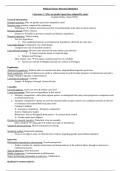Summary
Summary Literatuur- Political Science Research Method 1 (MAN-BPRA204)
- Course
- Institution
These are all the case studies of political science research methods that you need for the exam. By looking at the examples, you also learn the material better.
[Show more]



